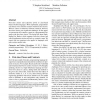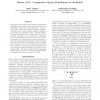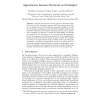23 search results - page 3 / 5 » dls 2010 |
DLS
2010
13 years 2 months ago
2010
Proxies are a powerful approach to implement meta-objects in object-oriented languages without having to resort to metacircular interpretation. We introduce such a meta-level API ...
DLS
2010
13 years 2 months ago
2010
First-class classes add expressive power to class-based object-oriented languages. Most importantly, programmers ract over common scenarios with first-class classes. When it comes...
ECAI
2010
Springer
13 years 5 months ago
2010
Springer
Non-standard reasoning in Description Logics (DLs) comprises computing a Least Common Subsumer (LCS), a Concept Difference, a Concept Unifier, or an Interpolant Concept, to name a ...
KR
2010
Springer
13 years 9 months ago
2010
Springer
Description Logics (DLs) are knowledge representation formalisms that provide, for example, the logical underpinning of the W3C OWL standards. Conjunctive queries (CQs), the stand...
DEXA
2010
Springer
13 years 5 months ago
2010
Springer
With the development of more expressive description logics (DLs) for the Web Ontology Language OWL the question arises how we can properly deal with the high computational complexi...



